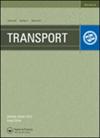LOCAL DETERMINANTS OF DRIVING BEHAVIOURS: INSTALLATION THEORY INTERVENTIONS TO REDUCE FUEL CONSUMPTION AMONG TRUCK DRIVERS IN COLOMBIA
IF 1.3
4区 工程技术
Q3 TRANSPORTATION SCIENCE & TECHNOLOGY
引用次数: 3
Abstract
Eco-driving has been linked to considerable reductions in negative externalities and costs for transportation companies, employees and communities (including fuel consumption, safety and emission benefits). Nevertheless, some of the biggest challenges to its implementation are related to promoting behavioural change among drivers. This paper presents the results of three behavioural field interventions that were successful to improve fuel efficiency in heavy freight transportation. The interventions brought further improvement even though the target company already had strong training, incentive, control and feedback procedures in place. The Installation Theory framework and the Subjective EvidenceBased Ethnography (SEBE) technique were used to systematically analyse determinants of driving behaviours, and to design cost-effective behavioural interventions based on social norms. The effects of three interventions were then tested using a pre-test post-test control group design among 211 drivers of the company. Results show significant decreases in average monthly fuel consumption of up to 4% in month 1 and up to 4.5% in month 3. Our findings show (with certain qualifications), that the Installation Theory framework and social norm interventions can be a cost-effective method to improve fuel efficiency in road freight transport companies, even when strong training, incentive, control and feedback procedures are already in place.驾驶行为的地方决定因素:安装理论干预措施,以减少燃料消耗的卡车司机在哥伦比亚
生态驾驶与运输公司、员工和社区的负外部性和成本(包括燃料消耗、安全和排放效益)的大幅减少有关。然而,实施该计划的一些最大挑战与促进司机的行为改变有关。本文介绍了三种行为领域干预的结果,成功地提高了重型货物运输的燃油效率。即使目标公司已经有了强有力的培训、激励、控制和反馈程序,这些干预措施也带来了进一步的改善。安装理论框架和基于主观证据的民族志(SEBE)技术被用于系统地分析驾驶行为的决定因素,并基于社会规范设计具有成本效益的行为干预措施。采用前测后测控制组设计对公司211名司机进行了三种干预措施的效果测试。结果显示,在第一个月和第三个月,平均每月燃油消耗量分别显著下降了4%和4.5%。我们的研究结果表明(在一定条件下),安装理论框架和社会规范干预可以是一种具有成本效益的方法,以提高公路货运公司的燃油效率,即使在强有力的培训、激励、控制和反馈程序已经到位的情况下。
本文章由计算机程序翻译,如有差异,请以英文原文为准。
求助全文
约1分钟内获得全文
求助全文
来源期刊

Transport
Engineering-Mechanical Engineering
CiteScore
3.40
自引率
5.90%
发文量
19
审稿时长
4 months
期刊介绍:
At present, transport is one of the key branches playing a crucial role in the development of economy. Reliable and properly organized transport services are required for a professional performance of industry, construction and agriculture. The public mood and efficiency of work also largely depend on the valuable functions of a carefully chosen transport system. A steady increase in transportation is accompanied by growing demands for a higher quality of transport services and optimum efficiency of transport performance. Currently, joint efforts taken by the transport experts and governing institutions of the country are required to develop and enhance the performance of the national transport system conducting theoretical and empirical research.
TRANSPORT is an international peer-reviewed journal covering main aspects of transport and providing a source of information for the engineer and the applied scientist.
The journal TRANSPORT publishes articles in the fields of:
transport policy;
fundamentals of the transport system;
technology for carrying passengers and freight using road, railway, inland waterways, sea and air transport;
technology for multimodal transportation and logistics;
loading technology;
roads, railways;
airports, ports, transport terminals;
traffic safety and environment protection;
design, manufacture and exploitation of motor vehicles;
pipeline transport;
transport energetics;
fuels, lubricants and maintenance materials;
teamwork of customs and transport;
transport information technologies;
transport economics and management;
transport standards;
transport educology and history, etc.
 求助内容:
求助内容: 应助结果提醒方式:
应助结果提醒方式:


